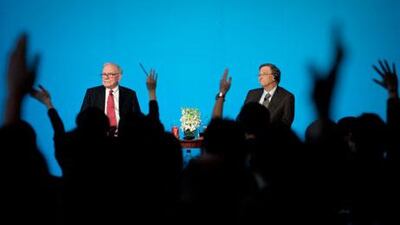It has become this year's most prestigious rich list. If your name is not on it, you are either not a billionaire or, in the financier Ted Forstmann's words, you are both a billionaire and "a jerk".
So far, 58 billionaires have signed The Giving Pledge, an initiative made public by Bill Gates and Warren Buffett this year, whereby individuals or families pledge to give at least 50 per cent of their wealth to charitable causes.
Mark Zuckerberg, the founder and chief executive of Facebook, the world's youngest billionaire, is the most recent high-profile signatory, but Michael Bloomberg, Warren Buffett, Bill and Melinda Gates and George Lucas are all on the list, and the AOL co-founder Steve Case and the former junk bond trader Michael Milken have also just signed up.
It is not unusual for the wealthiest Americans to commit so much to philanthropy, in a country where the prevailing view is that the job of looking after the most vulnerable in the society should not be achieved by the government levying more taxes on the rich but by the rich volunteering more cash from their own pockets. However, the scale of The Giving Pledge and the publicity that it has generated is unusual and in many quarters controversial.
What has this wave of pledging by America's super rich achieved? With 58 billionaires currently signed up, you could argue that that already represents a pretty good fund-raising drive.
But essentially, The Giving Pledge is just a high-profile statement of intent. The pledge represents a moral commitment to give, not a legal contract, and those pledging their wealth have only to say that they will commit these funds to philanthropy at some point during their lives or after they die.
Furthermore, although part of the idea is that The Giving Pledge will become a forum to exchange ideas about the best way to make philanthropy count, the emphasis is much more on who is donating than on how the cash will be disbursed.
The Giving Pledge neither pools funds nor supports particular causes. That is left to the individual, who is under no obligation to reveal what causes he or she supports.
These high-profile but vague avowals of support have generated much criticism.
Non-profit groups have expressed concern that there is no evidence that those who sign The Giving Pledge will specifically funnel cash to the most vulnerable in society - those who have been hit by cuts in government support and a decline in philanthropic giving during the recession.
Some who are part of The Giving Pledge have already made such a commitment: Mark Zuckerberg recently gave US$100 million (Dh367.3m) to the public school system of Newark, New Jersey. But overall, critics say The Giving Pledge offers no master plan, or indeed any plan, to solve society's problems.
And far-right advocacy groups are angered by what they see as an effort to press-gang the wealthy into parting with their money. The Ayn Rand Centre, a group modelled on the libertarian views of Ayn Rand, the author of Atlas Shrugged, has criticized Mr Zuckerberg and the others who are part of The Giving Pledge as trying to make other business people feel guilty for trying to keep their money.
A September article in Forbesmagazine jointly written by the centre's executive director, Yaron Brook, and of its analysts, Don Watkins, argued: "The Pledge treats your wealth, not as a justly earned reward, but as a gift from society - one that came with plenty of strings attached. The message is: Fulfil the obligation that came with your riches, give your wealth away - or hide your face in shame."
Of course, if this initiative succeeds in galvanising other wealthy potential philanthropists into action, even if their motivation is the positive publicity and the opportunity to avoid looking like shame-faced jerks, many would consider that a very good thing.
But beyond this, it is almost impossible to assess what the real-world impact of The Giving Pledge will be.

